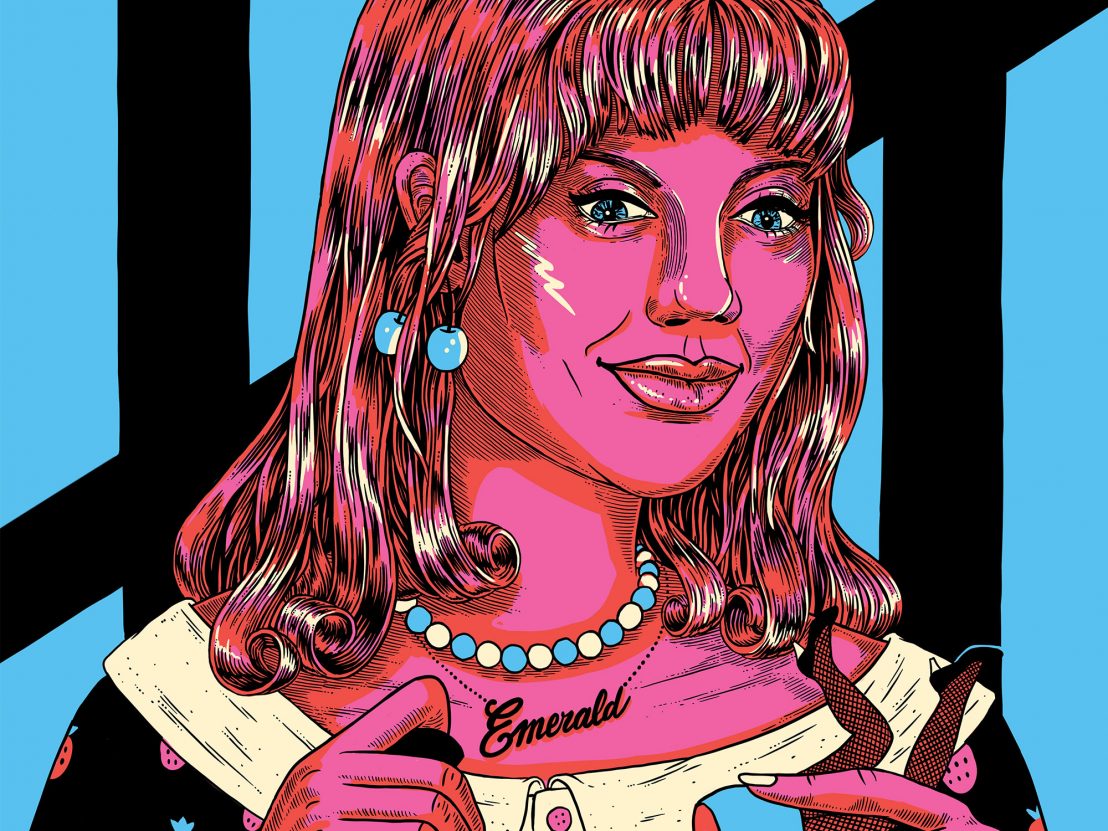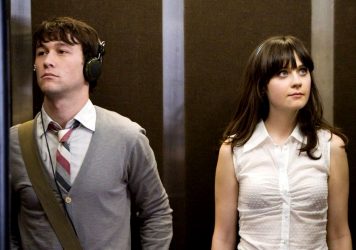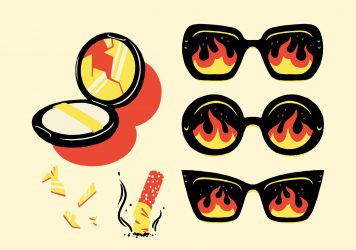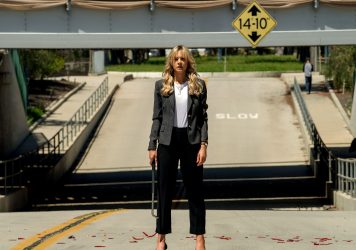
The writer/director shares her love of Paris Hilton and her frustrations with the way we talk about women in film.
Emerald Fennell is an actor, author, screenwriter and filmmaker with an enviable CV. Her 2018 short film Careful How You Go premiered at the Sundance Film Festival, and she returned there in January 2020 with her debut feature, Promising Young Woman – a blistering, candy-coloured meditation on societal complacency and female rage. It’s a change of pace from her previous role as head writer on Killing Eve, but Fennell achieves that rarest of things: a debut that arrives fully-formed. How did she do it?
LWLies: This feels like quite a radical film to have been made in the studio system. Did you experience any pushback?
Fennell: I think what was really good is that Focus came on board before we started shooting, so they already knew what it was. I’ve been so lucky, there were very few notes. And huge trust from them. And, y’know, it was a very small budget and a very short shoot. We did it in 23 days, which gave us an opportunity to say, ‘Let’s take this risk, let’s do something.’ I think the film is surprising, but it’s also not surprising at the same time. I wanted it to be real, and to also make a revenge movie about sexual assault. So you have to be honest about what happens. I think lots of people just felt that, and then understood that it wasn’t maybe as risky as it first seemed.
You’ve just come from serving as head writer on Killing Eve, which is very violent and visceral, but Promising Young Woman only features a small amount of violence. It feels quite different from the rape-revenge films we’ve seen before.
Well, it’s trying to subvert them really, as best as it can.
There’s such a focus in those works on the physical suffering women endure, whereas here we’re seeing the more emotional side of things and how, when someone is a victim of sexual assault, it can have far-reaching consequences.
Absolutely, and this happens so much, it’s so endemic. And when it happens to somebody you love, that can be harder to bear. I think women are very used to bearing things that happen to themselves. And it was important to me that in the film nobody would ever use the word ‘rape’ because they didn’t want to acknowledge what had happened. I wanted to make a film about something happening, everyone acknowledging that that thing happened, but feeling very differently about what it was, and this gap in experience and knowledge and empathy that can’t get breached. I didn’t want to do a horrible, violent film that focused on that stuff, because it’s completely triggering and horrible.
When you’re a woman watching films, you know about this. And you either know first hand or you know someone who’s been through it. You don’t need to see it.
No, and I didn’t want it to be lascivious or titillating. I think that I had to come at it from the point of view that, nobody wakes up and thinks they’re a bad person, and nobody looks back and thinks they’re a bad person.
How did Carey Mulligan come to the role of Cassie?
What I wanted from Cassie was somebody surprising, not somebody we’d seen do a part like this before in any way, so not someone from horror or comedy. I wanted somebody who felt enigmatic at the centre of this and who also felt slightly apart from it. And what I love about Carey is she’s an unbelievably talented actress, but I don’t know very much about her. She’s really private, she’s a real shapeshifter and her performances are always well rounded and challenging.
It helped enormously that she’s British and everyone else is American; obviously you can’t tell in the film, but there is a sense of otherness about her. I should say, she’s literally the kind of funniest, warmest, coolest person, but she’s just brilliant at keeping her personal life out of it. I’d seen Wildlife and she’s so fucking good, but she’s just not like anyone else. And also, like, she fucking shows up. She didn’t drop a single line in any scene. There are lots of geniuses who need space and time, but she is there immediately.
You’ve cast these archetypal nice guys as the sort of villains of the piece: Adam Brody; Bo Burnham; Christopher Mintz-Plasse. I feel like it’s a clever way to subvert the idea of what a villain looks like.
Or that they think they’re villains. I wasn’t interested in making a preachy, didactic film because I just wouldn’t wanna watch one myself, so I wanted to cast people that I think are genuinely brilliant and talented and funny and engaging and charismatic. But also, part of it is saying, isn’t it easy to judge men we don’t know. When and if it happens to someone you love, it’s amazing how much more complicated it is. I said this to all the actors all the time: ‘You absolutely believe you are right and you are a good person. If you don’t all of the arguments fall apart.’ And there are characters here who have said things that I’ve heard people say, or that I might have even said, honestly. And I can’t believe the talent I was able to get.
It was great to see Jennifer Coolidge playing Cassie’s mother.
Yes! There’s something also very feminine about Jennifer. Of course she’s unbelievably talented, but I really wanted to emphasise that, just because people have had a hard time of it, that doesn’t mean they don’t care, or that they don’t take great pride in the way they dress. Cassie doesn’t schlub around – she’s very particular, very precise, because she’s good at diverting attention away from herself and shapeshifting. Also, she doesn’t want anyone to ask any questions. Anyone who’s had any self-harming behaviour themselves, will know that the last thing they do is look unwell – they go the other way. But also, often we mistake things that are intrinsically female as being kind of silly.
Like the Paris Hilton song, ‘Stars Are Blind’.
Absolutely. I love that song, I’ve loved it for 15 years, ever since it came out. In Steve Martin’s autobiography, ‘Born Standing Up’, he talks about living next door to Disneyland and that he worked there as a teenager. There’s a passage where he talks about going there for the last time before he moved away, and he sees a trendy photographer taking photos of the Disneyland castle, and he wonders if she’s doing an ironic photoshoot or if she feels the way he does – that it’s beautiful. Someone decided things that were cool and not cool, things that were to be taken seriously and not seriously, and it’s bullshit. I genuinely care as much about Cassie’s manicure as I do about the bigger picture. It’s all details. It’s all important.
We contain multitudes, we’re allowed to care about our nails and our appearance.
It doesn’t make you not serious. And I think we’ve just been brought up so much on that, and also as part of that, making stuff, I think we’re only just now getting to the point where we’re allowed to say what we like and make what we like without having to feel that we need to make things that are to be taken very seriously.
“Our society has made assault and being accused of assault equivalent, which is fucking absurd.”
When you’re a woman navigating the entertainment world in general, that creative space, there’s a lot of resistance and a sense you have to be po-faced. But sometimes I just want to watch a really bad rom-com and genuinely enjoy it. The concept of ’guilty pleasures‘ always annoys me.
Fucking guilty pleasures, I hate it. It’s so passive aggressive. And also here’s the thing: we’re allowed aliens; we’re allowed insane, unimaginable galaxies of monsters. But we’re not allowed to fall in love in a cafe, wearing a lovely dress. People are like, ‘It’s not realistic’, ‘That’s not how the world is’. And I’m like, ’Fuck you! Why are other people allowed their crazy stuff and yet things that are romantic or beautiful or whatever are not allowed, not cool?”.
Going back to your earlier question about how we got the film made, the script was very dark. So I provided a playlist which had Paris Hilton and ’Something Wonderful’, Britney’s ’Toxic’, ’Boys’ by Charli XCX, and mood boards which were very almost psychotically detailed – the manicure was in there, the exact clothes, exact colour palette. I think that helped. Michael Perry, our production designer, the first thing he ever did was Sweet Valley High, and Nancy Steiner the costume designer did The Virgin Suicides, so I went to these people and told them I wanted the film to look beguiling. Cassie’s clothes are very tactile: soft; pink; inviting.
Why do you think we still have so much difficulty believing women when they come to us and say they’ve experienced something traumatic?
Because it challenges us. I think a lot of people are worried about themselves in a general philosophical sense, which means that, for some reason, our society has made assault and being accused of assault equivalent, which is fucking absurd. What I find very interesting about artists is that actors, singers, directors, writers, whatever it is, who are accused, nobody ever says, ‘I know this person did this but I still fucking love their work’. They say, ‘I don’t think they did this’. I feel like this film is is saying, ‘Look, we’re all bastards, we’re all complicated, we’re all not good, don’t fucking say you don’t believe someone because you like the other person.’
And there will be conversations about #MeToo around this film, but #MeToo didn’t invent this. We’ve all known for centuries, men just didn’t know we saw them. But also like, they don’t have to be scared if they admit fault. Imagine living in a world where all of us felt safe enough to do that when we fucked up, and when people caused us ill of any kind. I mean that’s the tension of everything isn’t it? Misunderstanding. Failure to communicate. Failure to understand. Failure to empathise. And I’m very aware that like I’m still coming from a position of enormous privilege. And so I think that we all just need to acknowledge it, at least first.
Half the battle is getting people to acknowledge these things are happening and do the work to improve it. You can’t just say it’s someone else’s problem, I think which is the big kind of stumbling block.
It’s also an industry that’s incredibly difficult to get into. And so then everyone feels very vulnerable so everyone protects themselves very tightly. It’s getting better though, I hope. It feels like it’s getting better.
Do you feel like it’s easier now for women on screen to be complex and make bad decisions?
Yeah, totally. But having said that, there’s still a sense that if you’re a woman you need to write about women’s stuff. I was pitching a sci-fi comedy a few years ago, at a company that makes exclusively sci-fi comedies, and after my pitch they said, ‘The thing is, we really want just like a really honest raw story about what it is to be a woman now’, and I was just like, ’No you fucking don’t, you just can’t imagine a woman writing anything else.’
And times that by 10 if you’re a trans actor or a woman of colour, having to always play a part where your ‘otherness’ is mentioned, where it’s made to be the main thing about you. These parts of our identity aren’t our whole lives. We’re not sitting around saying, ‘So having tits is a nightmare isn’t it?‘ or, ‘Bloody hell, bras eh? Periods?’ We just kind of get on with our lives. That’s what needs to change. Just allow us to exist as humans.
Read the LWLies review of Promising Young Woman.
Published 3 Feb 2021

By Leila Latif
Exploring the rich and disturbing cinematic history of benign stalking. Whoever said nice guys finish last?

By Emma Fraser
When women have their movie careers ruined by vindictive, controlling men, what happens next?

A ferocious lead turn by Carey Mulligan super-charges this shocking, outspoken debut that pulls none of its punches.